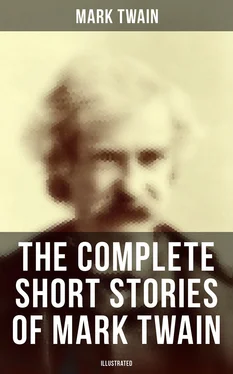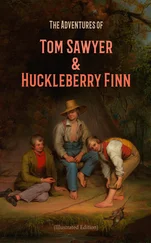"Brutus told his wretched accomplice to keep an eye on Lena, and a moment after Cassius urged that lean and hungry vagrant, Casca,'whose reputation here is none of the best, to be sudden, for he feared prevention. He then turned to Brutus, apparently much excited, and asked what should be done, and swore that either he or Caesar should never turn back—he would kill himself first. At this time Cesar was talking to some of the back-country members about the approaching fall elections, and paying little attention to what was going on around him. Billy Trebonius got into conversation with the people's friend and Caesar's—Mark Antony—and under some pretence or other got him away, and Brutus, Decius Casca, Cinna, Metellus Cimber, and others of the gang of infamous desperadoes that infest Rome at present, closed around the doomed Ceesar. Then Metellus Cimber knelt down and begged that his brother might be recalled from banishment, but Cassar rebuked him for his fawning, sneaking conduct, and refused to grant his petition. Immediately, at Cimber's request, first Brutus and then Cassius begged for the return of the banished Publius; but Ceesar still refused. He said he could not be moved; that he was as fixed as the North Star, and proceeded to speak in the most complimentary terms of the firmness of that star, and its steady character. Then he said he was like it, and he believed he was the only man in the country that was; therefore, since he was 'constant' that Cimber should be banished, he was also 'constant' that he should stay banished, and he'd he d—d if he didn't keep him so!
"Instantly seizing upon this shallow pretext for a fight, Casca sprang at Ceesar and struck him with a dirk, Ceesar grabbing him by the arm with his right hand, and launching a blow straight from the shoulder with his left, that sent the reptile bleeding to the earth. He then backed up against Pompey's statue, and squared himself to receive his assailants. Cassius and Cimber and Cinna rushed upon him with their daggers drawn, and the former succeeded in inflicting a wound upon his body; but before he could strike again, and before either of the others could strike at all, Caesar stretched the three miscreants at his feet with as many blows of his powerful fist. By this time the Senate was in an indescribable uproar; the throng of citizens in the lobbies had blockaded the doors in their frantic efforts to escape from the building, the sergeant-at-arms and his assistants were struggling with the assassins, venerable senators had cast aside their encumbering robes, and were leaping over benches and flying down the aisles in wild confusion towards the shelter of the committee-rooms, and a thousand voices were shouting 'Po-lice! Po-lice!' in discordant tones that rose above the frightful din like shrieking winds above the roaring of a tempest. And amid it all, great Caesar stood with his back against the statue, like a lion at bay, and fought his assailants weaponless and hand to hand, with the defiant bearing and the unwavering courage which he had shown before on many a bloody field. Billy Trebonius and Caius Legarius struck him with their daggers and fell, as their brother-conspirators before them had fallen. But at last, when Caesar saw his old friend Brutus step forward, armed with a murderous knife, it is said he seemed utterly overpowered with grief and amazement, and dropping his invincible left arm by his side, he hid his face in the folds of his mantle and received the treacherous blow without an effort to stay the hand that gave it. He only said, 'Et tu Brute?' and fell lifeless on the marble pavement.
"We learn that the coat deceased had on when he was killed was the same he wore in his tent on the afternoon of the day he overcame the Nervii, and that when it was removed from the corpse it was found to be cut and gashed in no less than seven different places. There was nothing in the pockets. It will be exhibited at the coroner's inquest, and will be damning proof of the fact of the killing. These latter facts may be relied on, as we get them from Mark Antony, whose position enables him to learn every item of news connected with the one subject of absorbing interest of today.
"Later.—While the coroner was summoning a jury, Mark Antony and other friends of the late Caesar got hold of the body, and lugged it off to the Forum, and at last accounts Antony and Brutus were making speeches over it and raising such a row among the people that, as we go to press, the chief of police is satisfied there is going to be a riot, and is taking measures accordingly."
An Item which the Editor Himself could not Understand
Table of Contents
Our esteemed friend, Mr. John William Skae, of Virginia City, walked into the office where we are sub-editor at a late hour last night, with an expression of profound and heartfelt suffering upon his countenance, and, sighing heavily, laid the following item reverently upon the desk, and walked slowly out again. He paused a moment at the door, and seemed struggling to command his feelings sufficiently to enable him to speak, and then, nodding his head towards his manuscript, ejaculated in a broken voice, "Friend of mine—oh! how sad!" and burst into tears. We were so moved at his distress that we did not think to call him back and endeavour to comfort him until he was gone, and it was too late. The paper had already gone to press, but knowing that our friend would consider the publication of this item important, and cherishing the hope that to print it would afford a melancholy satisfaction to his sorrowing heart, we stopped the press at once and inserted it in our columns:
Distressing Accident.—Last evening about 6 o'clock, as Mr. William Schuyler, an old and respectable citizen of South Park, was leaving his residence to go down town, as has been his usual custom for many years, with the exception only of a short interval in the spring of 1850, during which he was confined to his bed by injuries received in attempting to stop a runaway horse by thoughtlessly placing himself directly in its wake and throwing up his hands and shouting, which, if he had done so even the single moment sooner, must inevitably have frightened the animal still more instead of checking its speed, although disastrous enough to himself as it was, and rendered more melancholy and distressing by reason of the presence of his wife's mother, who was there and saw the sad occurrence, notwithstanding it is at least likely, though not necessarily so, that she should be reconnoitering in another direction when incidents occur, not being vivacious and on the look out, as a general thing, but even the reverse, as her own mother is said to have stated, who is no more, but died in the full hope of a glorious resurrection, upwards of three years ago, aged 86, being a Christian woman and without guile, as it were, or property, in consequence of the fire of 1849, which destroyed every blasted thing she had in the world. But such is life. Let us all take warning by this solemn occurrence, and let us endeavour so to conduct ourselves that when we come to die we can do it. Let us place our hands upon our hearts, and say with earnestness and sincerity that from this day forth we will beware of the intoxicating bowl.—First Edition of the Californian.
The boss-editor has been in here raising the very mischief, and tearing his hair and kicking the furniture about, and abusing me like a pickpocket He says that every time he leaves me in charge of the paper for half an hour, I get imposed upon by the first infant or the first idiot that comes along. And he says that distressing item of Johnny Skae's is nothing but a lot of distressing bosh, and has got no point to it and no sense in it and no informatien in it, and that there was no earthly necessity for stopping the press to publish it. He says every man he meets has insinuated that somebody about The Californian office has gone crazy.
Читать дальше












